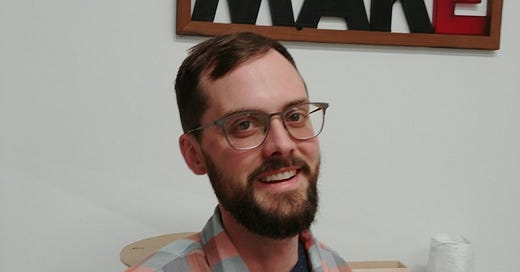Maryland's Makerspace Initiative
What was behind the effort to provide public funding for makerspaces in Maryland?
As far as I know, the Maryland Makerspace Initiative Program is the first of its kind in the United States, providing government support for the development of makerspaces. In April, the Maryland Legislature passed SB 453, which appropriated funds to be distributed to local governments and non-profits to assist in the establishment, programming or expansion of makerspaces in the state. Grants could be up to $100,000.
In the legislation, a makerspace was defined as a community space that:
provides access to tools, technology, and knowledge for learners and entrepreneurs;
results in the prototyping or creation of physical goods; and
supports the development of technical education opportunities for personal growth.1
It’s useful to have this basic definition of what a makerspace is. It’s also great that the grant funding could be applied to program development, not just physical space and equipment.
At the end of the July, the agency managing the grant program (TEDCO) announced that 20 makerspaces had been selected to receive funding in 2023. As you can see from the list of awardees, universities and libraries were among the recipients as well as local community makerspaces.
Allegany College of Maryland
Baltimore Jewelry Center
Baltimore Underground Science Space
Carroll County Public Library
Chesapeake Arts Center
College of Southern Maryland Foundation
DMV Petri Dish
Fashion Heritage Needle Trades Foundation
Frederick County Office of Economic Development
Howard County Library System
Makerspace of Annapolis
Melwood Horticultural Training Center, Inc.
Mid-Atlantic Gigabit Innovation Collaboratory
Morgan State University
PaxSpace, Inc. (won twice for different Makerspace projects)
Rockville Science Center
Salisbury University
Station North Tool Library, Inc.
Washington College
How did statewide funding for Makerspaces in the State of Maryland come together? The answer is now well-documented by Will Holman of Open Works, a makerspace that opened in 2016 in Baltimore, Maryland. The result is the Maker Policy Playbook, which is available for download (donation requested) from Open Works.
The effort to pass SB453 involved many organizations, including the Nation of Makers, Open Source Medical Supplies, and Coppin State University. The playbook shares insights that can help you turn advocacy for makers and makerspaces into actionable public policy. According to Holman, it starts with being clear what “the ask” is and what is for.
The Maryland Makerspace Initiative started by defining the ask as: “We respectfully request $5M over five years to build a network of affiliated public makerspaces to bring technical services within reach of all Maryland citizens.”2
Holman writes in the introduction that turning advocacy into actionable results takes time.
The hope is to generate more grassroots maker advocacy across the country. This is a very long-term project. As the history of U.S. libraries has shown, it took about 150 years to finally build up the policy and funding infrastructure necessary to transform libraries from scattered private organizations to widespread public institutions. Makerspaces are at the beginning of a similar institutional life cycle. The current pace of technological change, and society’s parallel failure to prepare our most vulnerable citizens for that change, is our collective project.3
https://www.tedcomd.com/makerspace
Maker Policy Playbook, page 10.
Maker Policy Playbook, Page 3.






